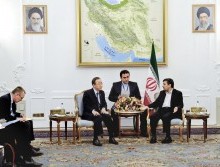
The United States is set to indirectly negotiate with Iran this week—along with the other nations signed on to the 2015 international nuclear deal between the sides—in an effort to restore nuclear compliance by Iran and American sanctions relief on Tehran. The nuclear accord, known as the Joint Comprehensive Plan of Action, had originally made that trade of Iran self-restricting their nuclear program in exchange for international sanctions relief. But years after the US withdrew from the deal arguing it was fatally flawed, and Iran resumed provocative nuclear activity, there remains a deep divide over which party should compromise first.
Now after months-long stalemate between Iran and the new US Administration of President Joe Biden—who has openly endorsed the US rejoining the nuclear deal—the US will be in Vienna where a mediator will “intensify separate contacts… with all JCPOA participants and the United States” in the context of “sanctions lifting and nuclear implementation measures,” according to a press statement from the European Union. Vox confirmed in a report that the US would not meet directly with the Iranians in the upcoming talks. The indirect discussions follow a meeting last Friday between European parties to the accord, China, Russia—which along with the US are known as the P5+1— and Iran, according to the press release posted to the European Union External Action Service website.
The US last week wasn’t sharing insights on exactly what they were willing to offer the Iranians so they resume adherence to the nuclear restrictions in the JCPOA, but they were open about the trade-off being discussed.
“We’re going to talk about nuclear steps that Iran would need to take in order to return to a compliance with the terms of the JCPOA. And we won’t preview any specific sanctions, but we’ll definitely say that sanction relief steps that the US would need to take in order to return to that compliance as well will be up for discussion,” spokesperson Jalina Porter told reporters on Friday in comments republished by the State Department.
While US spokesperson Ned Price told Vox the US isn’t anticipating a diplomatic “breakthrough” right away, in the separate comments to reporters, Porter called the Vienna indirect talks “a healthy first step forward, and we definitely want to underscore that.”
The US originally pulled out of the deal in 2018 after diplomacy pushed by then-US President Donald Trump failed to enhance the JCPOA to better address Iran’s malignant activities, including its missile program, and the so-called “sunset” clauses that relax nuclear restrictions on Iran after certain periods of time.
In the initial days after the announcement of the latest talks in Vienna, Israeli Prime Minister Benjamin Netanyahu has not made an official comment on them. However, as a longtime critic of the nuclear deal in arguing it effectively gives Iran a path to nuclear weapons, he has previously been outspoken in his objection to the US returning to the prior deal. However, it appears the US is willing to do just that if it will restore the JCPOA’s selective restrictions on Iran’s nuclear program.
“We have been clear for weeks now that we are ready to pursue a return to compliance with our JCPOA commitments, consistent with Iran also doing the same,” Price told reporters last Thursday in comments published by the State Department.
“We have also been open about the fact that we have been talking with our partners in the P5+1 context and elsewhere about the best way to achieve this, including through a series of initial mutual steps.”
Meiko Haas, the Foreign Minister for Germany—one of the European powers who originally signed on to the nuclear deal with Iran—expressed his support of the effort to bring the US back into the deal. In his view, once the nuclear accord is addressed, then other concerns—presumably about Iran—can be discussed.
“I am pleased that all relevant actors have agreed to meet in Vienna starting next week to work on fully implementing the JCPoA again,” he said in a statement from his office “…We have no time to lose. Returning to a nuclear agreement fully respected by all sides would be a plus for security in the entire region, and the best basis for talks on other important questions of regional stability.”
However, while the new US government and other world powers seem eager to put the pieces in the failed deal back together again, a warning from Netanyahu in February to Iran expressed the Israelis’ hopes that such a deal will address the broader Iran nuclear threat.
“We are not pinning our hopes on any agreement with an extremist regime such as yours,” Netanyahu said in a statement to Iran published by his office at the time. “We have already seen the quality of agreements with extremist regimes such as yours, in the past century and in this one, with the government of North Korea. With or without agreements—we will do everything so that you will not arm yourselves with nuclear weapons.”
(By Joshua Spurlock, www.themideastupdate.com, April 4, 2021)
